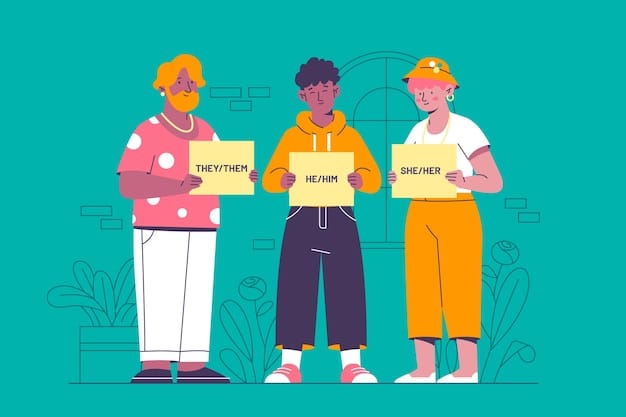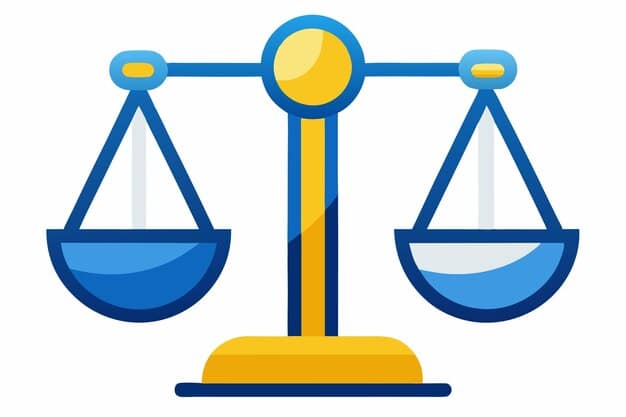New Gig Worker Regulations 2025: Rights & Responsibilities

New Regulations for Gig Workers: Understanding Your Rights and Responsibilities in 2025 involves significant updates to labor laws, impacting worker classifications, benefits, and employer obligations, aiming to provide greater security and fairness for gig workers in the United States.
The gig economy is evolving, and with it, the regulations governing it. Understanding your rights and responsibilities as a gig worker is more critical than ever. This article provides a comprehensive look at the New Regulations for Gig Workers: Understanding Your Rights and Responsibilities in 2025, ensuring you’re prepared for the changes ahead.
What’s Changing for Gig Workers in 2025?
The landscape of work is changing, and the gig economy’s prominence is undeniable. With this shift comes an increased focus on updating outdated labor laws to reflect the realities of modern work. So, what exactly has changed with the new regulations of 2025?
New regulations for gig workers in 2025 are designed to afford gig workers greater protections and to ensure fair treatment, addressing issues like worker classification and benefit accessibility.
Worker Classification: Employee vs. Independent Contractor
One of the central points of contention in the gig economy has always been how workers are classified. Are they employees, entitled to certain benefits and protections, or independent contractors, responsible for their own?
The new regulations seek to clarify this distinction, offering a more standardized approach to ensure legitimate independent contractors are not misclassified as employees to avoid employer obligations.
Impact on Benefits and Protections
Misclassification has long been a major complaint among gig workers. The new regulations also propose changes for benefits and protection.
- Providing access to health insurance options, which is often a significant barrier for gig workers to be able to adequately afford.
- Creating a pathway to retirement savings plans, helping gig workers secure their financial future.
- Guaranteeing minimum wage standards and overtime pay for those classified as employees.
These changes are aimed at creating a more equitable environment, acknowledging the contributions of gig workers and ensuring they receive fair compensation and protection.
In summary, the changes in 2025 are set to give gig workers greater security and fairness. The intent is to bring clarity in worker classifications and providing comprehensive benefits and protections.
Key Provisions of the New Regulations
To fully grasp the implications of the 2025 regulatory changes, it’s important to delve into the specific provisions. Among many, a few key items stand out as the top provisions to be familiar with.
New regulations cover a range of areas, each designed to address specific challenges within the gig economy. These provisions aim to protect workers and set standards for fair treatment.
Wage Standards and Payment Transparency
Ensuring fair wages and transparent payment practices is a top priority. The regulations stipulate clear guidelines for calculating wages, including minimum wage requirements and overtime pay.
Additionally, platforms are required to provide detailed breakdowns of payments, clearly outlining how rates are calculated and any deductions applied.
Protection Against Discrimination and Harassment
The new regulations also address the critical issue of discrimination and harassment, extending protections to gig workers regardless of their classification.
Platforms are mandated to implement robust policies and procedures for reporting and addressing incidents of discrimination and harassment, ensuring a safe and inclusive work environment for all.
- Mandatory anti-discrimination and anti-harassment training for platform operators.
- Establishment of confidential reporting mechanisms for workers.
- Swift and impartial investigation of all reported incidents.
These measures aim to create a zero-tolerance environment for discrimination and harassment, promoting dignity and respect in the gig economy.
In conclusion, it’s important to understand wage standards and payment transparency. Platforms are also mandated to implement policies against discrimination and harassment.
Understanding Your Rights as a Gig Worker
For those working within the gig economy, understanding your rights is essential. How does one become more aware of their rights within the gig economy?
Knowing your rights is the first step toward ensuring fair treatment and protection. With the new regulations in place, gig workers have access to various rights that safeguard their interests.
Right to Fair Classification
One of the most fundamental rights is the right to be classified appropriately, whether as an employee or an independent contractor. This classification determines your eligibility for certain benefits and protections.
If you believe you have been misclassified, you have the right to challenge this classification and seek reclassification if warranted.
Right to Workplace Safety
Regardless of your classification, you have the right to a safe working environment. Platforms are obligated to take reasonable steps to protect your safety while performing your work.
This includes providing adequate safety training, addressing hazards, and promptly responding to reports of safety concerns.
- Access to safety training and resources tailored to the specific nature of your work.
- Reporting mechanisms for identifying and addressing workplace hazards.
- Prompt response and investigation of safety concerns raised by workers.
In summary, knowing your rights regarding appropriate classification ensures you are not being misclassified. Also, all workers have the right to workplace safety, no matter how they are classified.
Responsibilities of Gig Workers Under the New Regulations
In addition to rights, the new regulations also outline responsibilities for gig workers. What are the responsibilities of the workers themselves?
Understanding these responsibilities is crucial for compliance and maintaining a positive working relationship with platforms and clients. While the new regulations ensure fair treatment, they emphasize that one must understand their responsibilities.
Compliance with Tax Laws
As a gig worker, you are responsible for complying with all applicable tax laws, including accurately reporting your income and paying self-employment taxes if classified as an independent contractor.
It’s essential to keep thorough records of your income and expenses and to understand your tax obligations to avoid penalties and ensure compliance.
Adherence to Platform Policies
You are also responsible for adhering to the policies and guidelines established by the platforms you work with. This includes maintaining professionalism, upholding quality standards, and respecting platform rules and regulations.
Failure to comply with platform policies can result in penalties, suspension, or termination of your access to the platform.
- Adherence to platform terms of service and code of conduct.
- Commitment to delivering high-quality services or products.
- Respectful and professional communication with clients and platform representatives.
In summary, gig workers must comply with all applicable tax laws. Also, they are responsible for adhering to platform policies and engaging in the platform responsibly.

How Platforms Are Adapting to the New Rules
With the introduction of the new regulations, platforms are adapting their practices to ensure compliance. It’s fair to say many platforms are likely under scrutiny for compliance with the regulations.
These adaptations include changes to worker classification processes, benefit offerings, and compliance mechanisms.
Changes to Worker Classification Processes
Platforms are reassessing their worker classification processes to ensure accuracy and compliance with the new standards. This may involve implementing more robust classification assessments or reclassifying workers based on the new guidelines.
Platforms are committed to providing transparent information to workers regarding their classification status and the associated benefits and responsibilities.
Implementation of Benefit Programs
Many platforms are implementing new benefit programs to provide gig workers with access to health insurance, retirement savings, and other essential protections.
These programs may involve partnerships with insurance providers or the creation of platform-sponsored benefit funds to help workers access affordable coverage.
- Partnering with insurance companies to offer subsidized health insurance plans.
- Establishing retirement savings programs with employer matching contributions.
- Providing access to disability and workers’ compensation insurance coverage.
Benefits also help to retain gig workers longer. Workers tend to go where the benefits are.
What to Do if Your Rights Are Violated
Despite the new regulations, violations of gig workers’ rights may still occur. Do you know what to do if your rights are being violated?
If you believe your rights have been violated, it’s essential to take action to protect yourself and seek justice.
Document the Violation
The first step is to document the violation, gathering as much evidence as possible. This may include screenshots, emails, contracts, or any other relevant documentation.
Detailed documentation will strengthen your case and increase your chances of a successful resolution.
Seek Legal Assistance
Consider seeking legal assistance from an attorney specializing in labor law or employment rights. An attorney can assess your case, advise you on your legal options, and represent you in negotiations or litigation with the platform.
Many legal aid organizations and pro bono attorneys offer free or low-cost legal services to gig workers who cannot afford legal representation.
- Contacting a labor rights advocacy group for guidance and support.
- Filing a complaint with the U.S. Department of Labor or other regulatory agencies.
- Pursuing mediation or arbitration to resolve the dispute outside of court.
Keep accurate records and have documentation of any violations. Speak with an expert in labor law.
| Key Point | Brief Description |
|---|---|
| ⚖️ Worker Classification | New rules clarify who is an employee vs. contractor. |
| 💰 Wage Standards | Greater transparency in payments and minimum wage enforcement. |
| 🛡️ Protection | New protections against discrimination and harassment. |
| 🧾 Tax Compliance | Gig workers must properly report income and pay taxes. |
Frequently Asked Questions (FAQ)
▼
Under the new regulations, a gig worker is defined as someone that performs duties for a company on a short-term contract or freelance basis as opposed to a full-time employment basis.
▼
The new regulations introduce clearer standards for distinguishing between employees and independent contractors, aiming to reduce misclassification and ensure proper worker protections.
▼
Depending on their classification, gig workers may be entitled to benefits such as minimum wage, overtime pay, access to health insurance, and retirement savings plans.
▼
Gig workers can protect their rights by documenting their work, understanding their classification, seeking legal assistance if needed, and reporting violations to regulatory agencies.
▼
Platforms are adapting by reassessing worker classification processes, implementing new benefit programs, and establishing compliance mechanisms to ensure adherence to the new regulations.
Conclusion
Navigating the new landscape of gig work in 2025 requires a thorough understanding of your rights and responsibilities. By staying informed, complying with regulations, and advocating for fair treatment, you can thrive in the evolving gig economy.





